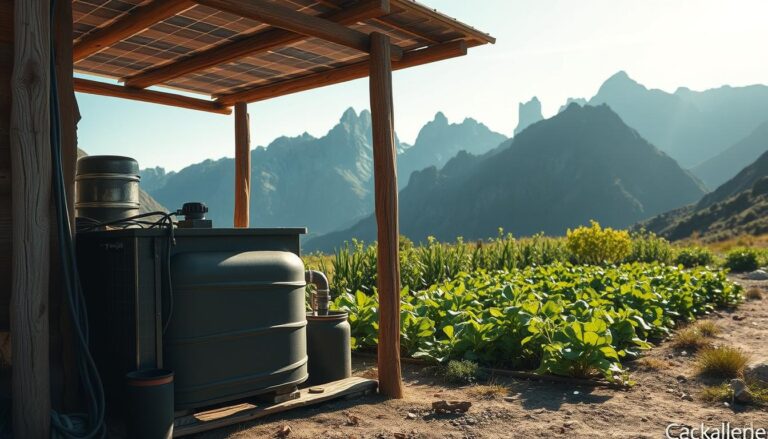5 Genius Ways to Power Your Off-Grid Water System
Did you know that nearly 1.8 million people in the United States live off the grid, relying on self-sufficient systems for their daily needs? For those embracing off-grid living, having a reliable off-grid water system is crucial.
A functional water system requires a consistent power source to pump, treat, and distribute water. Without it, daily life can become challenging.
Exploring innovative methods to power these systems is essential for those living off the grid. Reliable power solutions can make a significant difference in the efficiency and sustainability of off-grid water systems.
Key Takeaways
- Reliable power is crucial for off-grid water systems.
- Innovative power solutions can enhance system efficiency.
- Off-grid living requires self-sufficient water management.
- Consistent power sources are necessary for water treatment and distribution.
- Exploring alternative power methods is vital for sustainability.
The Critical Role of Water in Off-Grid Living
Water is the lifeblood of off-grid living, and having a reliable water system is crucial for sustainability. In off-grid communities, access to clean water is essential for drinking, cooking, and hygiene.
Why Water Systems Require Reliable Power
A reliable power source is necessary to pump, treat, and distribute water in off-grid settings. Without consistent power, water systems can fail, leading to shortages and other issues. Reliable power ensures that water is available when needed, making it a critical component of off-grid water systems.
Common Challenges of Off-Grid Water Access
Off-grid water access is often challenged by factors such as remote locations, limited infrastructure, and variable climate conditions. These challenges can make it difficult to maintain a consistent water supply. Common issues include water scarcity, contamination, and equipment failure.
Understanding Your Water System’s Energy Requirements
To ensure a reliable water supply, it’s essential to understand the energy requirements of your water system. This involves calculating the power needed to pump, treat, and distribute water. By understanding these needs, you can select the most appropriate power solution for your off-grid water system.
Assessing your energy requirements is crucial for designing an efficient and sustainable off-grid water system. This assessment will help you choose the right renewable energy source, such as solar or wind power, to meet your water needs.
Assessing Your Site for Off-Grid Water Power Options
Assessing your site’s natural resources is crucial for determining the best off-grid water power options. This initial step ensures that you can effectively power your water system, whether it’s for drinking, irrigation, or other uses.
Evaluating Available Natural Resources
To determine the most suitable power source, you need to evaluate the natural resources available at your site. This includes assessing sunlight for solar power, wind patterns for wind energy, and water flow for hydropower. Each of these resources can be harnessed using different technologies, so understanding what’s available is key.
Calculating Your Daily and Seasonal Water Needs
Understanding your water needs is vital for sizing your off-grid water system correctly. You need to calculate both your daily and seasonal water requirements. For instance, water needs for irrigation can vary significantly between summer and winter. Building an off-grid water system from a requires careful planning to meet these varying demands.
Determining Power Requirements for Pumping and Filtration
Once you’ve assessed your water needs, the next step is to determine the power required for pumping and filtration. This involves calculating the energy needed to pump water from its source to your storage or usage point, as well as the energy required for any filtration or treatment processes. A detailed analysis will help you choose the right off-grid water pump and alternative power sources for your water systems.
| Resource | Power Generation Potential | Suitability for Off-Grid Water Systems |
|---|---|---|
| Solar | High | Excellent for areas with consistent sunlight |
| Wind | Moderate to High | Good for windy locations |
| Hydropower | High | Ideal for sites with flowing water |
5 Genius Ways to Power Your Off-Grid Water System
Sustainable water management in off-grid settings demands reliable power sources. As we explore the most effective methods for powering off-grid water systems, it’s essential to consider innovative solutions that balance efficiency, cost, and reliability.
Overview of Innovative Power Solutions
Off-grid water systems can be powered using various innovative methods, including solar, wind, hydro, and hybrid systems. Each of these solutions has its unique advantages and is suited to different environmental conditions.
Solar Power: Harnesses energy from the sun, ideal for areas with high solar irradiance. Solar-powered water systems can be configured for direct pumping or battery storage.
Wind Power: Utilizes wind energy, suitable for windy locations. Wind turbines can power electric pumps or mechanical pumps directly.
Comparing Efficiency, Cost, and Reliability
When evaluating power solutions for off-grid water systems, it’s crucial to compare their efficiency, cost, and reliability. The following table summarizes these factors for the primary power methods:
| Power Method | Efficiency | Cost | Reliability |
|---|---|---|---|
| Solar | High | Moderate to High | High (with storage) |
| Wind | High | Moderate | Moderate (dependent on wind) |
| Hydro | Very High | High (initial investment) | Very High |
| Hybrid | Variable | Moderate to High | High |
Matching Power Methods to Different Water Applications
The choice of power method depends on the specific water application, including the volume of water needed, the height it needs to be pumped, and the available natural resources.
For instance, solar power is often ideal for small to medium-scale water pumping needs in sunny areas, while hydro power is more suitable for locations with flowing water resources.
By understanding the advantages and limitations of each power solution, individuals can make informed decisions to ensure a reliable and sustainable off-grid water system.
Genius Method #1: Solar-Powered Water Systems
Solar energy offers a reliable and renewable solution for powering water systems off the grid. By leveraging sunlight, individuals can reduce their reliance on fossil fuels and lower their operational costs.
Direct Solar Pumping vs. Battery Storage Options
There are two primary approaches to solar-powered water systems: direct solar pumping and battery storage. Direct solar pumping involves using solar panels to power a water pump directly, without the need for energy storage. This method is efficient and cost-effective for applications where water can be pumped during the day.
Battery storage options, on the other hand, allow for the storage of excess energy generated during the day for use at night or during periods of low sunlight. This provides a more consistent water supply and is particularly useful for communities with varying daily water needs.

Latest Innovations in Solar Water Technology
The field of solar water technology has seen significant advancements in recent years. Modern solar panels are more efficient, and pumps are designed to optimize energy use. Innovations such as maximum power point tracking (MPPT) controllers ensure that solar panels operate at their maximum potential, even under varying sunlight conditions.
Sizing Your Solar Array for Water Needs
Sizing a solar array correctly is crucial to meet your water needs. This involves calculating your daily water requirements and the energy needed to pump that water.
Peak Sun Hours Calculation
To size your solar array, you need to determine the peak sun hours (PSH) in your location. PSH varies by geographic location and season. Using this data, you can calculate the required size of your solar array to ensure it can generate enough energy to meet your water pumping needs.
Seasonal Adjustments and Positioning
It’s also important to consider seasonal adjustments and the positioning of your solar array. Adjusting the tilt of your solar panels seasonally can optimize energy production. In some cases, using a tracking system that follows the sun’s movement can further enhance energy generation.
By understanding these factors and applying them to your solar-powered water system, you can ensure a reliable and efficient water supply for your off-grid needs.
Genius Method #2: Harnessing Wind Energy for Water Pumping
Wind turbines are revolutionizing the way we power our off-grid water systems. By harnessing the power of wind, individuals can access a reliable and renewable source of energy for their water pumping needs.
Modern Wind Turbine Electric Systems
Modern wind turbine electric systems offer an efficient way to generate power for water pumping. These systems convert wind kinetic energy into electrical energy, which can then be used to power electric water pumps.
Key Benefits:
- Reliable and consistent power generation
- Low operational costs
- Reduced carbon footprint
Mechanical Windmill Pumps: Old Technology, New Applications
Mechanical windmill pumps have been used for centuries, but modern applications have revitalized their use. These pumps use wind energy to mechanically lift water, offering a simple and effective solution for off-grid water access.
“The revival of mechanical windmill pumps has provided a sustainable and low-cost alternative for water pumping, especially in remote areas.” – Expert in Renewable Energy
Hybrid Wind-Electric Storage Solutions
Hybrid wind-electric storage solutions combine the benefits of wind energy with battery storage technology. This allows for a stable and reliable power supply, even when wind conditions are unfavorable.
| System Component | Function | Benefit |
|---|---|---|
| Wind Turbine | Generates electricity from wind energy | Reliable power generation |
| Battery Storage | Stores excess energy for later use | Stable power supply |
| Electric Water Pump | Pumps water using electrical energy | Efficient water pumping |
By leveraging wind energy, individuals can create a sustainable and reliable off-grid water system. Whether through modern wind turbine electric systems, mechanical windmill pumps, or hybrid wind-electric storage solutions, wind power offers a viable alternative for powering water pumping needs.
Genius Method #3: Hydropower Solutions for Self-Sustaining Water
Harnessing the power of water through hydropower solutions is a genius method for self-sustaining water systems. Hydropower, a renewable energy source, can significantly reduce reliance on fossil fuels and provide a reliable means of powering off-grid water systems.
Micro-Hydro Generators for Electric Pump Power
Micro-hydro generators are an effective way to produce electricity for pumping water in off-grid locations. These systems work by converting the kinetic energy of flowing water into electrical energy, which can then be used to power electric pumps. The efficiency of micro-hydro generators makes them an attractive option for communities with access to a stream or river.
Key Benefits of Micro-Hydro Generators:
- Reliable and consistent power generation
- Low operational costs
- Minimal environmental impact
Hydraulic Ram Pumps: Water-Powered Water Pumps
Hydraulic ram pumps offer another innovative solution for powering water systems without the need for external energy sources. These pumps use the energy from flowing water to lift a portion of the water to a higher elevation, making them ideal for irrigation and water supply systems in remote areas.
The operation of hydraulic ram pumps is based on the principle of water hammer, where the sudden stoppage of flowing water creates a pressure surge that drives the pump.
| Feature | Micro-Hydro Generators | Hydraulic Ram Pumps |
|---|---|---|
| Energy Source | Kinetic energy of water | Flowing water |
| Power Output | Electricity for pumps | Mechanical energy for pumping |
| Application | Electric pump systems | Irrigation and water supply |
Stream-Side Mechanical Options
For locations where the installation of more complex systems is not feasible, stream-side mechanical options provide a simple yet effective solution. These systems can include mechanical pumps driven directly by the flow of the stream, offering a straightforward method for accessing water.
In conclusion, hydropower solutions, including micro-hydro generators, hydraulic ram pumps, and stream-side mechanical options, offer viable and sustainable methods for powering off-grid water systems. By harnessing the energy of water, communities can achieve a more reliable and self-sustaining water supply.
Genius Method #4: Gravity-Based and Mechanical Systems
In the quest for energy independence, gravity-based and mechanical water pumping systems present a genius solution. These systems offer a reliable and sustainable way to power your off-grid water system, reducing reliance on traditional energy sources.
Designing Efficient Gravity-Fed Water Networks
Gravity-fed water networks are a simple yet effective way to distribute water across your off-grid property. By leveraging the natural slope of your land, you can create a system that requires minimal energy input. To design an efficient gravity-fed network:
- Assess the topography of your land to determine the best route for your water pipes.
- Use larger diameter pipes to reduce friction and increase water flow.
- Minimize bends and turns in the piping to reduce pressure loss.
Human-Powered Pumping Innovations
Human-powered pumping is a viable option for small-scale off-grid water systems. Innovations in this area have led to more efficient and less labor-intensive solutions. For example, treadle pumps and manual piston pumps are effective for lifting water from shallow wells or streams.
Key benefits of human-powered pumping include:
- Zero energy costs, as they rely on manual operation.
- Low maintenance, with fewer mechanical parts to repair or replace.
- Environmentally friendly, producing no emissions or pollution.
Bicycle and Hand-Crank Water Solutions
Bicycle and hand-crank powered water pumps offer another creative solution for off-grid water pumping. These systems can be particularly useful in areas with limited access to other forms of energy. By converting human pedaling or cranking into mechanical energy, they can efficiently pump water for irrigation or household use.
“The use of bicycle-powered water pumps has revolutionized irrigation in rural communities, providing a reliable and sustainable source of water for crops.”
In conclusion, gravity-based and mechanical systems, including human-powered pumping innovations and bicycle or hand-crank solutions, offer practical and sustainable alternatives for powering your off-grid water system. By understanding and implementing these genius methods, you can achieve greater energy independence and reliability in your water supply.
Genius Method #5: Hybrid and Integrated Power Systems
In the quest for a self-sustaining water supply, hybrid power systems offer unparalleled advantages. By combining multiple energy sources, individuals can create a robust and reliable off-grid water system that adapts to various conditions.

Combining Multiple Energy Sources for Reliability
Hybrid systems integrate different power generation methods, such as solar, wind, and hydro energy, to ensure a consistent water supply. This diversification reduces dependence on a single energy source, enhancing overall system reliability.
Benefits of Hybrid Systems include improved energy security, reduced vulnerability to weather fluctuations, and the ability to optimize energy production based on available resources.
Smart Controllers and Automated Switching
Smart controllers play a crucial role in managing hybrid power systems. These advanced devices can automatically switch between different energy sources based on factors like energy availability, demand, and weather forecasts.
Automated switching not only optimizes energy use but also minimizes manual intervention, making the system more efficient and user-friendly.
Seasonal Adaptation Strategies
To maximize the effectiveness of hybrid power systems, it’s essential to implement seasonal adaptation strategies. This may involve adjusting the energy mix, modifying water storage, or altering pumping schedules to match seasonal water needs and energy availability.
- Adjusting solar panel angles to optimize energy capture during different seasons
- Utilizing wind energy during periods of higher wind speeds
- Implementing energy storage solutions to buffer against seasonal fluctuations
Emerging Technologies in Integrated Water Power
The field of integrated water power is witnessing significant technological advancements. Innovations such as more efficient solar panels, advanced wind turbine designs, and sophisticated control systems are enhancing the performance and viability of hybrid power systems.
As these technologies continue to evolve, we can expect even more efficient and reliable off-grid water systems, further supporting the goal of achieving sustainable water management.
Conclusion
As we’ve explored, there are five genius ways to power your off-grid water system, each offering unique benefits for sustainable off-grid living. By leveraging solar, wind, hydropower, gravity-based, and hybrid systems, you can ensure a reliable and efficient water supply.
These innovative power solutions not only enhance the sustainability of your off-grid water system but also provide the freedom to live self-sufficiently. When selecting a power method, consider your site’s natural resources, daily and seasonal water needs, and the energy requirements for pumping and filtration.
By adopting one or a combination of these five genius methods, you can create a robust and sustainable water system that meets your needs while minimizing your environmental footprint. This approach to off-grid living enables you to enjoy a reliable water supply while contributing to a more sustainable future.







